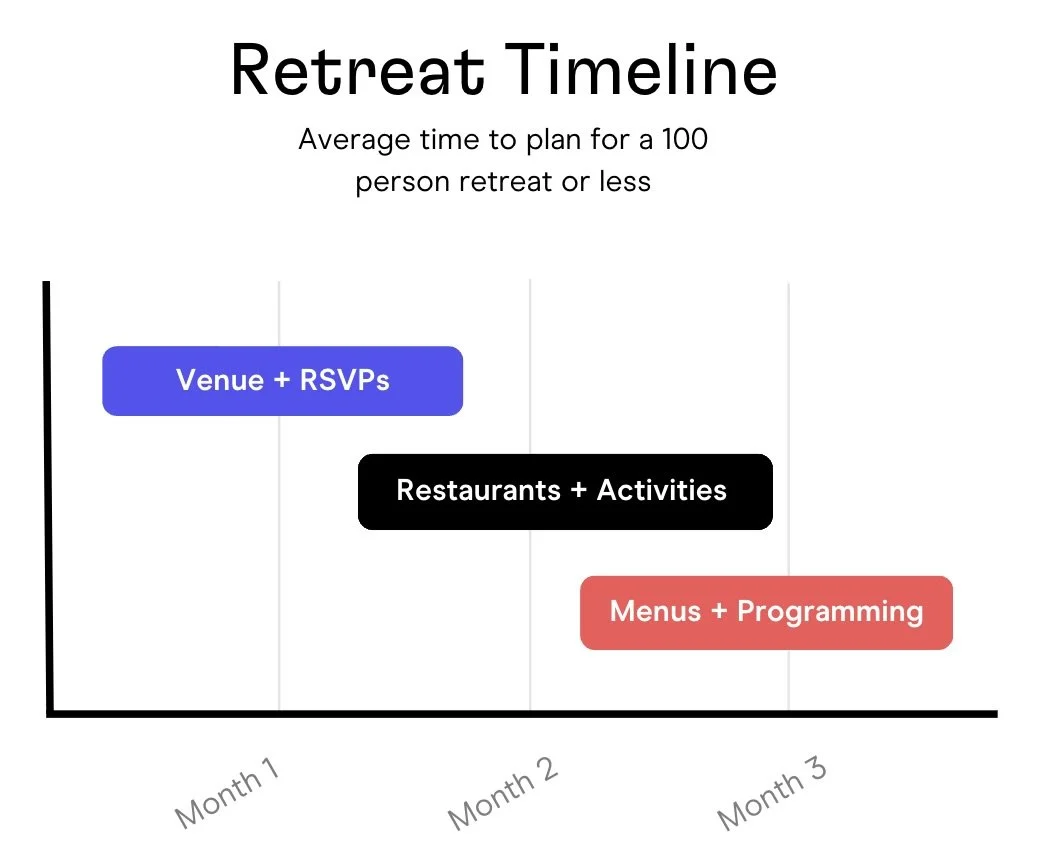Event Planning Timeline: The Best Time to Start Planning an Offsite or Retreat
Planning
Event Planning Timeline: The Best Time to Start Planning an Offsite
Nikki Herzog · 8/31/2024Imagine this, you’ve been tasked with project planning an offsite or retreat for your team. And your manager wants your input on how much time you think it would take to pull something like this off.
Maybe even suggesting a deadline, can we make this happen for next month!? And while you aren’t quite sure how long it would take, you know you’ll need more time than that!
And of course you don’t want your offsite to feel like it came together haphazardly because your limited planning time went to the logistics of getting your colleagues into one place, leaving you with little thought to enhance the experience with those magic details!
Your team is depending on YOU!
Because when you give yourself enough time it means…
√ More time to be thoughtful with programming = Enhanced ROI
√ Less stress = less mistakes from you as the planner
√ Saves money; time for budgeting and intentional vendor finds
So, what does a Retreat Project Timeline look like?
When planning a retreat or offsite for under 100 guests, we recommend giving yourself a 3 month timeline to plan before your desired event or offsite date.
The first month you should focus on hotel research/outreach and going to contract. The second month you should focus on activities and restaurants. And the final month, spend time buttoning up your programming at your meetings and activities for ultimate bonding and collaboration.
Offsite Timeline Order of Operations
Regardless of retreat size, this is how your planning will flow:
Location Selection, Travel & Budget: Selecting your location, estimating airfare costs and travel logistics, and putting together your offsite budget all go hand in hand, so focus on these core details as early as possible.
Hotel & Date Selection: In tandem, you’ll need to begin early with the hotel, contracts and solidifying hotel rooms. If you are considering optional dates, ensure your entire team is on board to gather on those dates so you can leverage this in the negotiation stage.
Activities & Flight Planning: Once the more pressing logistical details of your offsite are ironed out, you can begin reaching out to vendors for activities and restaurants. This is also a good time to make sure flights are being booked, whether that means colleagues are booking their own flights or a team member is booking on their behalf.
Programming: Then as the structure of the retreat takes shape, begin filling in the dots with what you want to happen with the programming within those activities and spaces. The content, presentations, and messages of your offsite need time and focus, too!
The most time consuming part of any retreat plan is getting responses from vendors in a time frame that fits with your project plan. So start those conversations immediately, because your timeline may not be their timeline, unfortunately!
How to Think about Time
Whether you are already in process planning an offsite or retreat, or want to get ahead of the curve and start planning your events for 2025, here are some general rules for offsite and retreeat planning:
Maximizing Your Event Planning Timeline
Time-Saving Tips
Collaborate with your colleagues; don’t go at it solo!
Utilize your connections to vendors or hotels in order to find the right place or be connected to established sources.
Confirm location and dates early on
Empower colleagues to book their own flights
Utilize turn-key packages for experiences. Example: hiring a gaming company to run a trivia activity vs. you trying to create a custom trivia game from scratch.
Event Timeline Challenges to Avoid
Not knowing where you want to go and when. This creates back and forth between you, your managers and your colleagues.
Multiple decision makers. The more decisions that have to be made spread out across many people that need to give their input, will create a longer time lapse of decisiveness on your team.
Traveling to a coveted location during a busy time period — think sporting events, parades, conferences etc.
The larger your guest list, the more time you will want to give yourself to plan.
Designing empty venues spaces by bringing in furniture and fixtures on your own.
Deep itinerary planning work for high production offsites. This includes keynotes, speakers, agenda, breakout groups, entertainment etc.
Need Help Getting Your Event Planned in Time?
If you’ve got an offsite on the horizon and aren’t sure you have enough time to get it all done, don’t stress! Our events team at BoomPop can take the heavy lifting off your plate and help you plan a high-impact offsite or retreat.
Not sure you can dedicate the time to planning your retreat? We have a dedicated Events Team, ready to stand in and help you plan the retreat of your company’s dreams. Connect with us here.



















